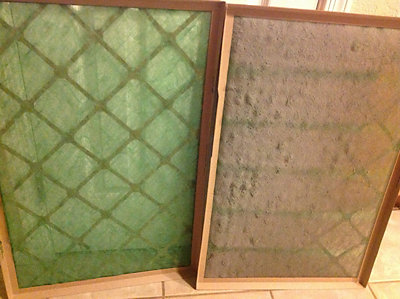Why Is Ice Building on My A/C Unit’s Pipes?
So, your AC stopped blowing cold air and after investigating, you found ice on your AC unit’s refrigerant lines. And now you’re wondering if that’s normal.
Unfortunately, ice anywhere on your AC unit is definitely not normal. Now, ice build-up on your unit can happen if you happen to be running your AC in sub 65-degree weather, but we’ll assume you aren’t.
So, if you have ice building on your AC refrigerant lines, you have one of the following 2 problems:
- Restricted airflow over evaporator coils
- Low refrigerant levels
Not sure which problem you have? Don’t worry. We’ll explain both of these problems, why they lead to a frozen AC and what you can do to fix the problem.
Restricted airflow can cause ice build-up on your AC unit
When your AC doesn’t “breathe” in enough air, the part that actually cools the air (the evaporator coil) gets too cold and eventually freezes over.
Here’s why: The evaporator coil is basically a large web of refrigerant coils. And the refrigerant inside those coils can reach temperatures as low as 10-20 degrees Fahrenheit. Now, normally, there’s enough warm unconditioned air passing over those coils to prevent ice or frost build-up.
But when there’s not enough warm air passing over your evaporator coils, the evaporator will quickly ice over (and ice will travel along the refrigerant lines). And the ice builds even faster as humid air hits the coils, condenses and freezes.
Problems that can lead to restricted airflow include:
- A clogged air filter
- Collapsed air ducts
- Dirt on your evaporator coil
- Blower fan problems
- Closed or blocked vents
What to do:
- Move the thermostat setting from COOL to OFF immediately.
- Turn the thermostat fan setting to “ON” and wait 3 to 4 hours before turning your unit back on. The ON setting runs the fan even when the AC itself isn’t cooling. So, the fan helps draw in warm unconditioned air from your home and blows it over those cold coils to speed up the thawing process.
- Check your air filter. Replace it if it looks like the filter to the right in the pic below.

Clean filter (left) vs dirty filter (right)
- Check all return vents. Make sure that they’re open and not blocked by furniture/drapes/etc.
- Have a professional inspect and repair your AC. If you’ve checked for the problems above and haven’t yet found the reason your AC is freezing, have a professional take a look at your system, find the problem and repair it.
Low refrigerant levels can cause ice build-up on your AC unit
Your AC uses a special chemical called refrigerant to absorb heat from inside your home and transfer that heat outdoors. But if refrigerant levels drop, the refrigerant pressure inside your evaporator coil drops as well. And when the pressure drops so does its temperature. Eventually, the low refrigerant temperatures cause ice to form on evaporator coils.
Only one thing causes your AC’s refrigerant levels to drop: a refrigerant leak.
You see, your refrigerant is housed inside a closed circuit of copper coils and unlike gas in a car, refrigerant never gets “used up”. So, if you have low refrigerant levels, the only explanation is that refrigerant has found a way to escape (i.e., via a hole in your refrigerant coils).
Signs of a refrigerant leak include:
- A hissing or bubbling noise somewhere along the refrigerant lines
- You feel warm air from your vents
- Higher-than-usual electric bills
What to do:
- Turn your thermostat setting from COOL to OFF immediately.
- Turn the thermostat fan setting to “ON” and wait 3 to 4 hours for the entire system to thaw.
- Have a professional repair your AC system if you think you have a refrigerant leak. Refrigerant is a toxic chemical that can only be handled by certified professionals.
Note: Beware contractors who recharge your system without repairing the leak first. If they don’t first repair the leak, you’ll find yourself paying for another refrigerant recharge very soon (and refrigerant is pricey).
Need a Denver tech to inspect your frozen AC?
Need help determining what’s causing your AC to freeze up? We can help. Just contact us and we’ll send an experienced tech over right away. We provide expert air conditioning repair in Denver and the surrounding areas, including: Arvada, Aurora, Boulder, Castle Rock, Highlands Ranch, Littleton, Longmont, Thornton, Wheat Ridge, and more.
See also:
Need help from a Colorado Plumbing, Heating, Cooling, or Electrical Specialist?
For your convenience, you can request an appointment in one of two ways:
- Call us at (303) 436-2525 for immediate assistance.
- Click on the button below to schedule your appointment online.
Related Reading
Join Our Email Newsletter
Receive updates, current news, promotions, and industry tips.
